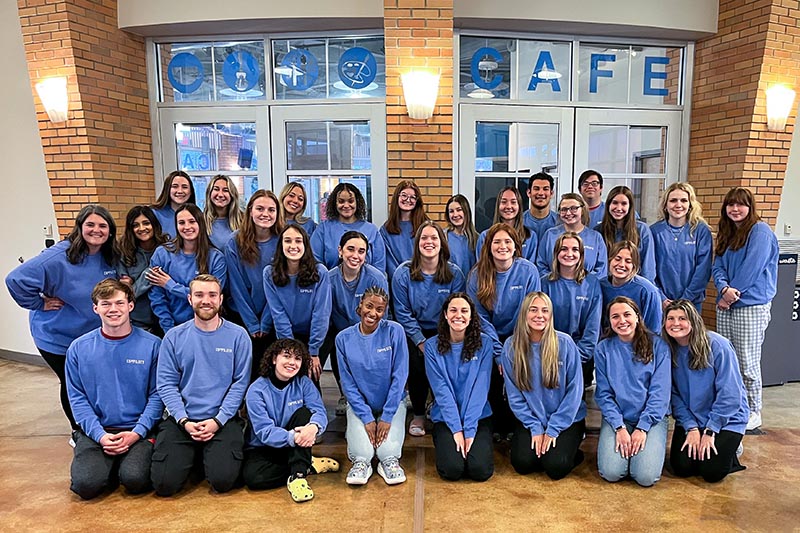Alumni and Friends Making an Impact

Co-Piloting Peer Advocacy
When senior Tina Sandhu came to the University of Dayton, she noticed something was missing. As a psychology major and previous member of her high school’s Hope Squad, a peer-to-peer-based suicide prevention group, Sandhu realized that the University could benefit from a similar program. Unbeknownst to Sandhu, the health and well-being staff were creating a mental health peer education program, and they needed a student with passion to start the momentum. Thus, in collaboration, the Co-Pilots program was formed.
“Mental health has always been something that I’ve been passionate about, and I saw there was a real need for resources on campus,” shared Sandhu. “So I talked to staff members within Student Development, and we got the ball rolling with starting Co-Pilots.”
Co-Pilots is a mental health and well-being peer education group. The main focus is on mental health, but it also focuses on the importance of sleep, fitness, healthy relationships, social connections and everything that goes into your holistic well-being.
Thanks to donations to the Student Development Fund for Excellence during last year’s One Day, One Dayton, UD’s annual day of giving, peer education groups, including Co-Pilots, have flourished on campus.
Students who serve as Co-Pilots facilitate one-on-one conversations with students, offering support, connecting them to resources and helping them to develop realistic, attainable goals. Co-Pilots also participate in various programming on campus, including awareness events, presentations and collaborations with other campus partners.
“My passion is the more individualized one-on-one conversations,” said Sandhu. ”We're not therapists or counselors, but all the students you're talking to are going through the same things as you, so we can help them set goals from the perspective of someone who is going through those things at the same time.”
Senior Patrick Szubryt has a similar story, joining Co-Pilots after looking for opportunities to get involved in peer mental health programs on campus. But for him, his passion lies in the presentations.
“There are a lot of different ways that you can get and stay involved,” shared Szubryt. “I like to do the presentations. It’s beneficial for the students, but I also get a lot of reward from it because it makes me a better public speaker.”
In addition to supporting and connecting with their peers, Co-Pilots gain various skills while participating in the program. Co-Pilots become certified in the peer education process through the National Association of Student Personnel Administrators, receive training on motivational interviewing, learn the importance of asking the right questions, and how identity, boundaries and communication play a role as a peer educator. Co-Pilots are also trained in the suicide prevention program REACH, and facilitate Project Connect, a program for students looking for new social connections.
“I think getting training like that is just so important for students on campus, especially with the depression and anxiety rates right now,” said Sandhu. According to the annual Healthy Minds study, out of 96,000 undergraduates surveyed nationally, 44% reported symptoms of depression, 37% said they experienced anxiety and 15% said they have seriously considered suicide.
All of the training and education occur throughout the semester, as peer educators engage in a required one-credit hour mini-course and the Co-Pilot retreat, which occurs a few days before spring semester move-in. It's all made possible through generous donations from alumni, parents, faculty, staff and students.
“Student mental health is always a key area that needs support,” shared Melissa Longino, assistant vice president for health and well-being and executive director, campus recreation. “These are the programs where students are getting to not only feel seen and cared for, but then they’re able to able to utilize the skills developed to positively impact their peers.”
Lindsey Young, assistant director, mental health education within the Brook Center and adviser for the Co-Pilots program, sees firsthand the true impact of the program on students.
“We are seeing the true value of what experiential learning can do in the lives of our students,” she shared, adding that the impact goes far beyond the student’s four years on campus — it ripples throughout their communities and the lives of everyone around them.
